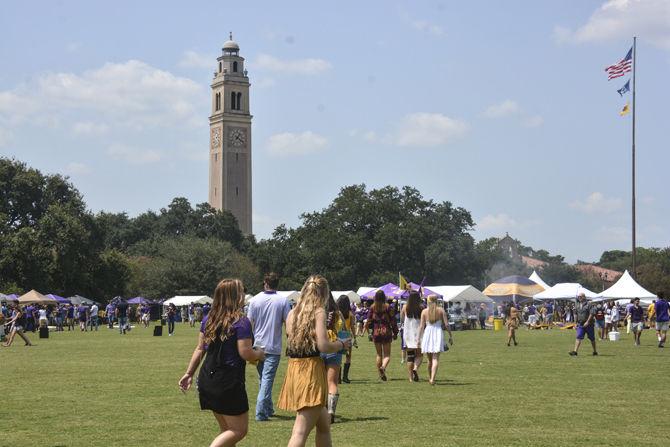Louisiana Ca$h’s “From Louisiana” is a fan favorite when it energizes crowds at Tiger Stadium, Alex Box Stadium and the Pete Maravich Assembly Center. Students scream the lyrics at opponents letting them know their trip to the Pelican State will be rough and unfulfilling. More than 21,000 University students tell the truth when they sing the lyrics — they are indeed from Louisiana.
The University is home to 3,845 out-of-state undergraduate students, according to the Office of Budget and Planning Fall 2017 report. The number stands small in comparison to the number of in-state students. Despite being a small portion of the campus population, out-of-state students are quick to try to enjoy the southern hospitality and adjust to the Louisiana culture.
Microbiology freshman Olivia Kluzhka is from the suburbs of northern Chicago. She said she was attracted to the organization and hospitality on campus immediately, and cited them as a few of the reasons she attended the University.
“I really like[d] how the campus was set up and everybody was so nice,” Kluzhka said.
Not every student feels that same hospitality. Biology sophomore Corey Cooper found the culture much different and struggled to assimilate.
“From my background, my community and friends in Washington heavily focused on education, progression and baseball,” Cooper said. “In Louisiana football, partying and the more fun social aspects of life appear to be the cultural focuses. It has felt very difficult finding roots and there is this constant feeling of ‘I don’t belong’ that circulates my life since coming to Louisiana.”
LSU Campus Connections works to help out-of-state students adjust to life in Louisiana. The organization offers social events like Bengal Bound and What’s the Big Deal About Jambalaya in the fall to help students interact and network with other students.
LSU Campus Connections Director Missy Korduner describes these events as a wonderful way for out-of-state students to connect and acclimate to the culture.
“They aren’t able to ‘just go home’ for a weekend or on short breaks,” Korduner said. “This is where Campus Connections is crucial to student engagement. Helping our students find their home away from home and make connections on campus makes it easier for them to make friends, learn about LSU and engage in the campus community.”
Cooper found community involvement to be the best method in climbing the cultural barriers.
“What I’ve come to do to combat that depressing barrier is to simply participate in my community,” Cooper said.
Natural resource ecology and management freshman Christian Mann is from Presque Isle, Maine. Mann found life in Louisiana very easy to adjust to, thanks to the culturally diversity of the state.
“Louisiana is a big culture pot,” Mann said. “We have Mardi Gras, different ethnic backgrounds, and it’s just one of those places where there is always something to do.”
Mann does struggle on the weekends, though. Since his family lives in Maine, Mann said he cannot visit his family on the weekends and miss home-cooked meals.
“The weekends here can be very boring,” Mann said. “Campus almost becomes dead, and the way you could improve that is with more programs. Football games are about the only times that LSU is ever packed on the weekends. I hate being stuck in my room. I’m a very social person.”
Mann said he believes the only way to counter the lack of University activity on the weekends is to have more programs on weekends without home football games. He sees that as a terrific way to increase the social atmosphere on weekends, he said, but realizes that it is unlikely since the out-of-state population is so small.
Regardless of the lack of campus activity on campus weekends, out-of-state students continue to overcome the regional culture differences with a little help from community involvement and Campus Connections.
“There are a multitude of ways that students can connect, engage and get support at LSU from a variety of offices and there is something for everyone,” Korduner said. “Each student can create their own unique experience that works for them. We want our students to be successful and by utilizing the resources, asking for help when needed and engaging in the campus community, they can be successful.”








